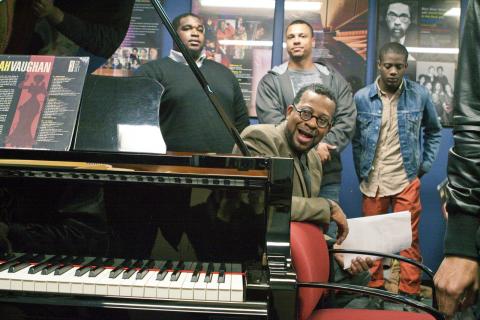Minor in Music and Society: Africana Studies Track
Through the music and society minor, Africana studies track, students explore the disciplines of Africana studies, black studies, and cultural studies. Students evaluate racial and ethnic identities as presented by artists, musical groups, and society in general as they gain awareness of race as part of the multifaceted nature of identity. Students analyze the impact of African American and African music on American music, as well as on music from other countries. The minor encourages students to analyze the impact of race and ethnicity in the presentation, representation, and interpretation of the performance and promotion of music. Students also examine the historical and sociological constructs of race and ethnicity as they draw insights from fields across the arts, humanities, social sciences, and natural sciences. The music and society minor, Africana studies track, also provides students with the theoretical and methodological skills necessary to understand a rapidly changing and increasingly complex and interconnected world.
Students must take LENG-111 Writing and Communication and follow the regular declaration of minor procedure as outlined in the Registration Guide.
- College students: submit the Declaration of Major/Minor form to the Liberal Arts Department. See detailed instructions in the Registration Guide.
- Conservatory students: submit the Declaration of Minor form to the Registrar's Office.
Upon completion of a minor in music and society: Africana studies track, students will:
- synthesize and integrate knowledge from the disciplines of Africana studies, black studies, and cultural studies;
- evaluate racial and ethnic identities as presented by artists, musical groups/styles, and society;
- analyze the impact of African American and African music on American music, as well as on music from other countries;
- understand key terminology in the disciplines of Africana studies, black studies, and cultural studies;
- compose written and oral communications; and
- apply critical thinking and practical reasoning.
Required Course (one course; 3 credits)
- LHIS-224 Africana Studies: The Sociology of Black Music in American Culture (3 credits)
Elective Courses (choose two courses; at least 5 credits):
- LHIS-225 Africana Studies: The Theology of American Popular Music (3 credits)
- LHIS-226 Africana Studies: Biographies in Black (Music, Lives, and Meanings) (3 credits)
- LSOC-355 City Life: Local and Global Perspectives (3 credits)
- HR-361 World Music, Materials, and Concepts for the Contemporary Musician (2 credits)
- MHIS-341 African American Music, History, and Culture—Contemporary Connections (2 credits)
- PSW-346 African Diaspora: South American Music (2 credits)
Elective Courses (choose at least 4 credits):
- ENFF-301 The Music of Steve Coleman (1 credit)
- ENFF-302 The Music of the Crusaders (1 credit)
- ENFF-303 The Music of the Meters (1 credit)
- ENPN-266 Gospel Keyboard Techniques Ensemble (1 credit)
- ENRB-300 The Music of James Brown (1 credit)
- ENRB-301 '70s R&B/Funk (1 credit)
- ENRB-302 R&B/Funk Rating 5 (1 credit)
- ENRB-303 R&B/Smooth Jazz (1 credit)
- ENRB-401 The Music of P-Funk (1 credit)
- ENRB-402 The Music of Tower of Power (1 credit)
- ENRT-405 Reverence Gospel Ensemble (2 credits)
- PS-180 Music and Life of Bob Marley (2 credits)
- PSPR-361 Motown (2 credits)
- PSW-341 The Music of Ghana (2 credits)
